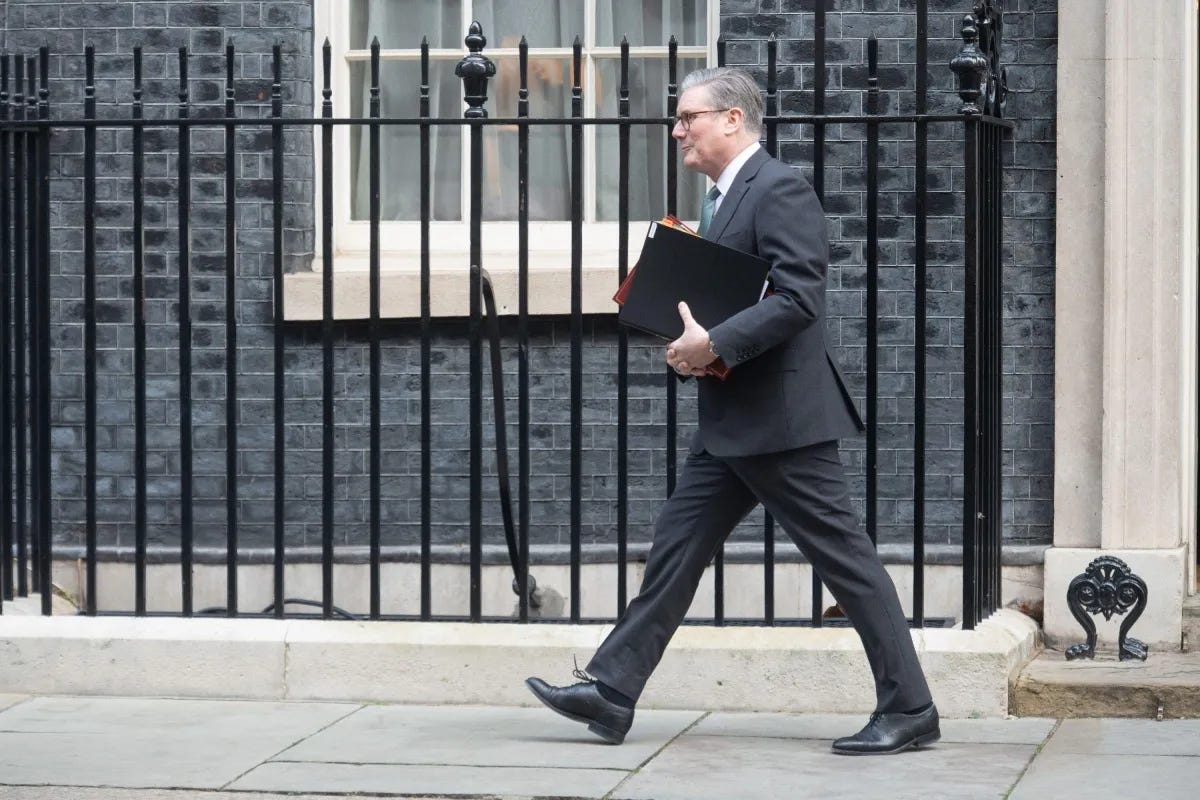Good evening. It’s Jack Dickens here standing in for Caitlin Allen, who is off on holiday for a well-deserved break from global events. Here’s your daily briefing from the Reaction team.
Ministers are pressing ahead with plans to cut £5bn a year from government spending on health-related benefits, despite signs of rising discontent within the Labour party. Amid protests from his own MPs, Sir Keir Starmer now faces a serious test of his leadership. The success or failure of the proposed changes to welfare could be a defining moment for his premiership, and will likely decide the fate of his broader drive to reform and reinvigorate the British state.
Seeking to get ahead of the critics, the Prime Minister and his supporters have gone on the offensive, setting out the case for cutting back the country’s ballooning welfare bill. There are reports of Labour MPs being invited in batches to Downing Street to be briefed by the Prime Minister’s head of liaison, Claire Reynolds, wielding a slideshow of scary graphs showing the unsustainable trajectory of Britain’s benefits spending.
The figures are dizzying. According to data from the Institute for Fiscal Studies, four million working-age Britons – roughly one in ten – now claim either disability or incapacity benefits, up from 2.8 million before the Covid-19 pandemic. The IFS data show that the number of young people claiming sickness benefits has increased substantially: one in fifteen under the age of 25 are now claiming compared to just one in twenty-four in 2019. The UK is also an outlier among comparable European countries, most of which have experienced a fall in the number of people claiming health-related benefits since the end of the pandemic.
According to the Office for Budget Responsibility, government spending on working-age health and disability benefits is set to rise to almost £76 billion by 2030. To put that into context, the UK is due to spend just under £60 billion on defence in 2025/26.
Downing Street has said that there is an unambiguous “moral and economic case for fixing our broken system”. Wes Streeting, the health secretary, on Sunday took aim at the “overdiagnosis” of mental health conditions, and argued that a serious effort must be made to put Britain’s welfare state on a “sustainable” long-term footing. And today, the work and pensions secretary, Liz Kendall, spoke in Parliament of bringing “trust and fairness” back to the system. She is due to set out the details of the government’s welfare reforms in a green paper tomorrow.
The government’s programme is expected to include plans to tighten the eligibility criteria for those who claim personal injury payments (PIPs) – the cost of which has doubled in five years – and cut the top rate of incapacity benefit. There are corresponding proposals to increase the basic rate of Universal Credit for the unemployed, as part of an effort to rewire the system so that it provides greater incentives to seek work.
Still, the measures have caused some disquiet within Labour ranks. Prominent critics include Andy Burnham, the Mayor of Greater Manchester, who has expressed his concern that altering the eligibility criteria for PIPs “would trap too many people in poverty”. Meanwhile, Diane Abbott has declared that “cutting money for disabled people is not a Labour thing to do”.
Critics have also raised concerns about the impact the reforms will have on those who are too disabled to work, many of whom are reliant on the generous provision of the current system and could be affected by indiscriminate cuts.
The likelihood is that Starmer and the Labour supporters of welfare reforms will have an almighty fight on their hands. The backlash has already begun, and will only become more intense in the coming days, as a host of charities, lawyers, backbenchers, and their sympathisers in the cabinet all put further pressure on the government to back down and reverse course.
Yet the government seems to be digging its heels in. For better or for worse, Sir Keir and his ministers have demonstrated their willingness to stick by politically difficult and unpopular decisions. They have ridden out the furore over last year’s cuts to the winter fuel allowance and changes to agricultural property relief. Figures across the political aisle are hoping that they can show a similar resolve on welfare reform – one of those highly sensitive policy areas, much like the NHS, where only a Labour government has the political cover to fundamentally shake up the system.
Indeed, this could be a crucial moment for Sir Keir Starmer’s premiership. The proposed changes will not in themselves fix Britain’s chronic worklessness or stagnating growth without wider economic reforms beyond the welfare system. Nonetheless, they are a crucial litmus test for Starmer’s claim to be serious about reinventing the British state and making it more efficient.
The reforms will also show whether he can actually use his large parliamentary majority to get difficult things done, or whether, like his conservative predecessors, he will squander his commanding position in the Commons. If Starmer falls at this hurdle, it will suggest that he lacks the force of character required to shake up the UK’s sclerotic healthcare system, or to boost Britain’s defence budget and face down Russian aggression. Make no mistake, the next week will be a serious examination of the Prime Minister’s mettle.
Iain Martin
Great PMs learn and improve. Can Keir Starmer do it?

READ HERE
Ian Stewart
Rearming Europe will be a vast undertaking

READ HERE
Former President of the Philippines arrested for crimes against humanity
Former President Rodrigo Duterte was arrested at Manila’s main airport on charges of crimes against humanity related to his “war on drugs”, following a secret International Criminal Court warrant. En route to The Hague, Duterte accepted responsibility for his anti-drug campaign. A pre-trial hearing is scheduled for September.
Netanyahu Seeks dismissal of Security Chief
Israeli Prime Minister Benjamin Netanyahu aims to dismiss Ronen Bar, head of Israel’s Shin Bet security service, amid growing distrust and investigations into Netanyahu’s aides. Analysts believe that this move represents a continuation of the power struggles that have been playing out in Israel’s government since the October 2023 Hamas attack and subsequent Gaza war.
UK Government considers banning ‘backdoor’ political donations
The UK government is exploring measures to prohibit foreign donors from using UK-registered companies to make political contributions. Officials are considering restricting donations based on a company’s revenue in order to prevent foreign influence in British politics.
Young Americans’ trust in government declines sharply
Gallup data analysed by the Financial Times reveals that less than a third of Americans under 30 trust their government. Factors underlying these results include political polarisation, economic challenges, and a perceived lack of personal freedom, with 31% saying in 2024 that they feel a lack of freedom, a figure higher than in most developed countries.
1. It looks like Labour may have no answer to the UK’s teacher shortage. In UnHerd.
2. Trump’s loyalists have taken command of the FBI, the New York Times reports.
3. Nature explores the story of the Israeli and Palestinian scientists who continued collaborating amid the recent conflict in Gaza.
4. In Wired: how is the Anti-DEI agenda re-programming America?
5. Syria’s sectarian trap, in Engelsberg Ideas.
